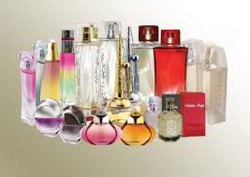Perfumes
Perfumes (gandha, sugandha or vāsa) are compounds made from the essential oils of certain plants and other odorous substances. They are used to cover unpleasant odors or to make the body smell attractive. The ancient Indians mainly wore flowers to do the job of perfumes although they did manufacture perfumes too. The centre of the perfume trade was Kāsi, modern Vārāṇasī. The Tipiṭaka mentions about two dozen types of perfume, some of those still used today being camphor (kappūra), hellebore (kaṭukarohiṇī), Indian frankincense (salaḷa), Indian cassia (tamāla) and sweet flag (vaca, Ja.I,290; II,416; M.II,184; S.III,157). Usīra, the delicate pink-colored sweet-smelling root of bīraṇa grass, was much sought after although it is rarely used today (Dhp.337).
The two most expensive perfumes were made from spikenard (narada) and sandalwood (candana). The Buddha considered the spicy, woody scent of the spikenard root (kāḷānusārī) to be the most pleasant of all root fragrances (A.V,22; Ja.VI,537). The dark honey-brown wood of sandal was ground into a paste and rubbed on the body or sometimes the oil extracted from it was applied (Ja.IV,440; Thi.145). Like spikenard, sandalwood was also burned as incense. A beautiful legend says that sandalwood powder fell from the heavens just as the Buddha passed away (D.II,137).
The Buddha often equated virtue (sīla) with perfume in the sense that both enhance the attractiveness of the person who has them, both are experienced as pleasant and both have an effect beyond their immediate vicinity. Concerning this last point, he said that the man or woman who has taken the Three Refuges, practises the five Precepts and has a lovely nature (kalyāṇadhamma), is talked about and praised over a far wider area than even the most strong perfume can pervade (A.I,225). On another occasion he said: ‘The perfume of flowers, sandalwood or jasmine does not pervade downwind, but the perfume of the good person pervades all directions. Amongst all perfumes – sandalwood, jasmine, water lilies or vassika, the perfume of virtue is the best.’ (Dhp.54-5). Most of us take great care that we smell pleasant or at least that we have no smell. Much less attention is given to whether we are pleasant. See Aromatherapy and Makeup.
